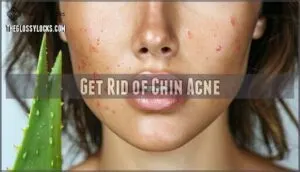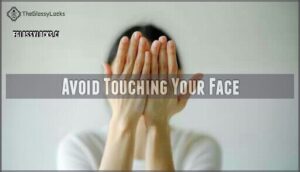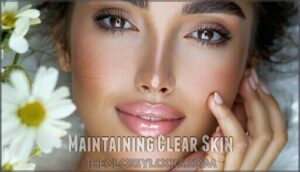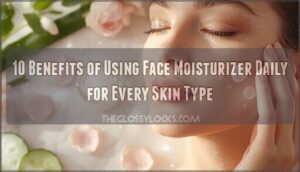This site is supported by our readers. We may earn a commission, at no cost to you, if you purchase through links.

Incorporate aloe vera gel to calm irritated skin and speed healing. Clean pillowcases weekly since they harbor bacteria that transfer to your face. Avoid touching your face throughout the day, and maintain a simple cleansing routine with non-comedogenic products.
Drinking water and reducing sugar intake creates an internal environment where breakouts become less frequent. The right combination of these approaches can transform your skin’s health, leading to a noticeable improvement in acne reduction, by utilizing natural remedies.
Table Of Contents
- Key Takeaways
- Causes of Cheek Acne
- Get Rid of Chin Acne
- Natural Acne Remedies
- Lifestyle Changes Matter
- Preventing Future Breakouts
- Common Acne Triggers
- Maintaining Clear Skin
- Frequently Asked Questions (FAQs)
- How do you treat chin and cheek acne?
- What naturally kills acne?
- What can I drink to clear acne?
- What kills acne quickly?
- How to get rid of chin acne for good?
- How do I get rid of hormonal chin acne?
- How do you get rid of acne on your skin?
- What causes chin acne?
- How do you get rid of Chin Zits?
- What are the different types of acne on my chin?
- Conclusion
Key Takeaways
- Use natural remedies like diluted tea tree oil, green tea toner, and aloe vera gel to reduce inflammation, kill bacteria, and speed healing of acne breakouts on your cheeks and chin.
- Keep your face clean by washing twice daily with non-comedogenic products, changing pillowcases weekly, and avoiding touching your face to prevent transferring bacteria and oils.
- Modify your diet by reducing refined sugars, processed foods, and high glycemic index foods while staying hydrated to create an internal environment less conducive to breakouts.
- Manage stress hormones through regular exercise, adequate sleep (7-9 hours nightly), and relaxation techniques like meditation, as stress hormones can trigger or worsen acne flare-ups.
Causes of Cheek Acne
Cheek acne happens when oil, dead skin cells, and bacteria clog your pores, leading to inflammation.
Hormonal changes, stress, certain medications, and poor hygiene are common triggers that make breakouts worse, including hormonal changes.
Hormonal Changes
Fluctuating hormones can trigger cheek and chin acne, especially during puberty, the menstrual cycle, or conditions like PCOS.
Elevated androgen levels increase oil production, clogging pores.
To manage hormonal acne:
- Consider hormone therapy for severe imbalances.
- Maintain a consistent skincare routine targeting oil control.
- Consult a doctor if cheek or chin acne persists or worsens, which can help in achieving oil control.
Stress
Stress messes with your skin by triggering stress hormones like cortisol, which increases oil production and worsens acne severity.
Ever notice cheek acne flaring up during busy weeks? That’s the mind-body connection at work.
Stress reduction can help—try deep breathing, yoga, or downtime to improve emotional wellbeing.
It’s not instant, but less stress often means clearer skin, and this is achieved through consistent stress reduction.
Medications
Certain acne medications may worsen cheek acne. Prescription creams or topical prescriptions can irritate sensitive skin.
Oral antibiotics treat severe cases, but prolonged use might lead to resistance. Hormonal medications help balance breakouts tied to periods or PCOS.
Isotretinoin risks include dryness or peeling. Watch for signs like:
- Acne flares from steroids
- Breakouts with lithium use
- Antidepressant-triggered acne
- Acne-like eruptions from anticonvulsants, which can be considered acne-like eruptions or anticonvulsants but for clarity, we note isotretinoin risks.
Poor Hygiene
Neglecting regular skin cleansing can invite facial acne.
Dirty pillowcases, unclean makeup brushes, and touching your face with dirty hands spread bacteria.
Infrequent washing or sharing towels traps oils and dirt, clogging pores and causing cheek or chin acne.
Swap shared towels for personal ones, wash pillowcases weekly, and establish a consistent face cleaning routine to minimize breakouts and maintain good hygiene by following a regular cleaning routine.
Get Rid of Chin Acne
Chin acne can be stubborn, but simple steps can help clear it up.
Hormonal acne often flares during menstrual cycles or puberty, so addressing hormone imbalances may help.
For hygiene, wash your face gently twice daily to control sebum and remove debris.
Avoid touching your chin—hands introduce bacteria and oils that worsen breakouts.
Tight masks or straps can trigger acne mechanica, so loosen them when possible.
Shaving improperly can lead to ingrown hairs, which mimic chin acne; always shave carefully with clean tools.
Opt for acne home remedies like diluted tea tree oil for bacterial control or aloe vera to soothe inflamed skin.
Consider apple cider vinegar for its lactic acid, which can help with acne scars.
A consistent approach combining cleanliness, sebum control, and natural remedies can substantially reduce breakouts in this area.
Natural Acne Remedies
You can tackle acne naturally using simple remedies that target inflammation and bacteria without harsh chemicals.
Ingredients like tea tree oil, green tea, and aloe vera are scientifically backed for their skin-healing properties.
Tea Tree Oil
Tea tree oil stands out among acne natural remedies for its antibacterial punch.
Research shows 5% TTO concentration reduces breakouts effectively.
For chin acne, dilute it properly—undiluted TTO application irritates sensitive skin.
Apply twice daily as a spot treatment for clogged pores.
Remember, TTO side-effects like dryness are common, so moisturize after.
You can also find specialized tea tree products for acne.
It’s a powerful, simple acne treatment that is easy to use, making it a great option for those looking for a natural remedy.
Green Tea
Like tea tree oil, green tea packs a punch for acne treatment.
Its polyphenol effects target sebum reduction, calming acne inflammation effectively.
A natural remedy for chin acne, green tea’s topical application can help manage breakouts by reducing bacteria and oxidative stress.
You can find specialized green tea products online.
For an acne natural treatment, choose cleansers or toners containing green tea—your skin will thank you!
Aloe Vera
Aloe vera is a soothing natural remedy for acne. Rich in anti-inflammatory properties, it helps calm red, irritated pimples.
Apply aloe gel directly to your skin as a spot treatment. Research shows its benefits in reducing inflammation.
Different aloe types vary, so choose pure gel. You can purchase aloe products online for convenience.
While generally safe, some experience side-effects like irritation. Test before full application.
Honey
Honey is a sweet fix for acne treatment, boasting antioxidants and antibacterial power.
It soothes skin while fighting bacteria. Try a honey mask or mix it with yogurt for a quick natural remedy.
- Honey benefits: Moisturizes and calms inflamed skin.
- Honey application: Spot treat pimples or use as a face mask.
- Honey types: Raw honey works best.
Witch Hazel
Witch hazel is a natural remedy for acne that works wonders for redness and inflammation.
It’s extracted from the witch hazel shrub, and it’s packed with tannins offering antibacterial properties.
Use it as a toner to clean skin gently or prevent scarring.
Sensitive skin? Test first for side effects.
Explore this table for quick insight:
| Benefit | Use | Alternatives | Side-Effects |
|---|---|---|---|
| Reduces inflammation | Natural toner | Tea tree oil | Skin irritation |
| Antibacterial | Apply with cotton pad | Aloe vera | Dryness if overused |
| Controls acne | Spot treatment | Green tea extract | Sensitivity issues |
| Prevents scarring | Daily use, post-cleanse | Honey + Cinnamon masks | Redness possible |
Lifestyle Changes Matter
Your daily habits play a vital role in keeping acne at bay, especially on your cheeks and chin.
By making small changes, like staying hydrated and managing stress, you can support clearer, healthier skin naturally.
Stay Hydrated
Drinking enough water improves skin hydration and supports your natural acne treatment efforts.
Proper water intake flushes toxins and keeps hydration levels balanced, reducing the likelihood of clogged pores.
Swap sugary drinks for beverages like herbal teas or just plain water.
Skin that’s hydrated from within looks healthier, making it harder for chin acne or cheek breakouts to thrive, and it supports your natural acne treatment efforts by keeping hydration levels balanced.
Reduce Stress
Stress triggers hormones that can worsen acne. Managing stress helps calm both your skin and mind.
Try these stress management tips:
- Practice mindfulness techniques, such as yoga or meditation.
- Focus on sleep quality; aim for 7-9 hours nightly.
- Enjoy light exercise benefits for mood and stress relief.
- Use deep breathing to relax quickly and avoid triggering acne breakouts.
A balanced diet is also important, as it helps in maintaining healthy skin.
Eat a Healthy Diet
Eating an acne-friendly diet helps your skin.
Focus on anti-inflammatory foods like fresh fruits, vegetables, and fatty fish rich in omega-3.
A low glycemic diet stabilizes blood sugar, reducing flare-ups.
Boost gut health with probiotics and hydrate often to flush out toxins.
Don’t skip essential vitamins and minerals—your skin loves the balance they bring!
Exercise Regularly
Exercise helps regulate hormones, reduce stress, and boost circulation, all of which support healthier skin.
Sweat from workouts can clog pores, so prioritize post-workout hygiene. Keep exercise intensity balanced to avoid excessive sweating, and always rinse off promptly.
Regular activity complements good skin care and a balanced diet, making it an essential step in managing acne naturally, with regular exercise and a focus on balanced diet.
Avoid Touching Your Face
Your hands carry bacteria, even when they appear clean.
Constantly touching your face transfers dirt and oils, worsening cheek and chin acne.
Break the habit with mindfulness and simple tricks:
- Keep your nails clean to avoid transferring bacteria.
- Use a stress ball to keep hands off your face.
- Clean your phone regularly to reduce bacteria exposure.
Preventing Future Breakouts
Preventing breakouts requires consistency and simple adjustments in your routine.
By keeping your skin clean, controlling stress, and avoiding habits like touching your face, you can reduce the chances of clogged pores and irritation.
Exfoliate Regularly
Exfoliation clears clogged pores, reduces acne, and enhances skin health.
Use physical exfoliation like scrubs or chemical exfoliants like salicylic acid for gentle skin exfoliation.
Don’t over-exfoliate—it can irritate skin and worsen acne. Stick to 2-3 times weekly for normal skin and adjust for sensitivity.
Exfoliating regularly helps acne treatment and prevents future breakouts naturally, which is crucial for maintaining good skin health.
Keep Hands Away
Keeping your hands off your face is a game-changer for preventing breakouts.
Looking at the paragraph about keeping hands off your face, I’ll create a concise, engaging blockquote in the same informative yet conversational tone:
Your fingers are bacteria taxis—stop giving them free rides to your face!
Fingernail bacteria from public surfaces can transfer to pores, worsening cheek and chin acne.
Reduce touching with these steps:
- Wash hands often, especially after touching shared items.
- Stay mindful of facetouching habits.
- Use reminders, like sticky notes or cues, to build conscious awareness.
Manage Stress
Stress hormones can wreak havoc on your skin, making acne worse.
To manage stress and improve emotional health, prioritize sleep quality, as exhaustion amplifies stress.
Meditation benefits include calming your mind and reducing stress hormones, which play a role in chin acne.
Regular exercise impacts both stress and overall health while supporting natural remedies for clear skin.
Common Acne Triggers
Understanding what triggers acne can help you make better choices for your skin. Certain foods, like refined sugars and high-glycemic options, may increase oil production and clog your pores.
Refined Sugars
Refined sugars can worsen acne by triggering insulin spikes, which may increase oil production and inflammation.
This inflammation link disrupts gut health, potentially leading to chin acne.
Instead, opt for sugar alternatives like honey or stevia to curb sugar cravings.
An acne diet focused on lowering refined sugar intake helps manage breakouts naturally, especially when combined with effective natural remedies.
Lifestyle factors such as poor sleep can also trigger acne flare-ups.
Processed Foods
Processed foods can worsen acne by affecting gut health and increasing skin sensitivity.
Additives and preservatives may trigger inflammation, while nutrient loss in these foods impacts your skin’s natural defense.
It’s not just about greasy chips—processed snacks and ready meals can also contribute to chin acne and cheek breakouts.
A balanced acne diet helps prevent flare-ups, and understanding the role of processed foods and their impact on skin sensitivity is crucial.
High Glycemic Index Foods
High glycemic index foods can cause insulin spikes, increasing sebum production and an inflammation link tied to acne.
Watching your diet helps! High glycemic foods often lead to breakouts as they impact your insulin levels, triggering acne.
- Examples to limit: White bread, sugary cereals, soda, candy.
- Choose instead: Quinoa, whole grains, leafy greens.
- Focus on: Low glycemic diets.
- Impact: Clearer skin through smarter food choices.
Maintaining Clear Skin
Keeping your skin clear starts with a consistent skincare routine, a balanced diet, and enough sleep every night.
These simple habits help regulate oil production, reduce inflammation, and support overall skin health.
Regular Skincare Routine
A solid skincare routine starts with proper facial cleansing.
Keep your cleansing frequency consistent—twice daily is ideal.
Choose gentle products designed for acne skin care and layer them correctly: cleanser, treatment, moisturizer.
Don’t skip sunscreen; it defends against damage.
At night, focus on a natural skincare approach, letting your skin breathe.
Effective acne home care stems from small, consistent efforts.
Balanced Diet
While a consistent skincare routine forms your first defense, what you eat directly affects your skin from within.
Your diet can either fuel or fight acne.
- Gut health impacts skin clarity—probiotics in yogurt and fermented foods can help
- Food sensitivities to dairy or gluten may trigger breakouts
- Anti-inflammatory foods like berries and leafy greens reduce redness
- Proper hydration flushes toxins that contribute to acne
- Micronutrient intake of zinc, vitamin A, and antioxidants supports skin healing
Adequate Sleep
Getting enough sleep is essential for acne-free skin.
During deep sleep, your body repairs skin cells and balances hormones that affect oil production. A simplified routine can also help maintain clear skin by reducing product overload.
| Sleep Factor | Impact on Acne |
|---|---|
| Sleep Duration | 7-9 hours reduces stress hormones |
| Sleep Quality | Deep sleep enhances cell repair |
| Circadian Rhythm | Regular schedule normalizes hormones |
| Sleep Hygiene | Clean pillowcases prevent bacteria |
| Consistency | Steady patterns reduce inflammation |
Frequently Asked Questions (FAQs)
How do you treat chin and cheek acne?
Treat chin and cheek acne with gentle cleansers containing salicylic acid.
Apply tea tree oil or aloe vera.
Maintain a low-glycemic diet, change pillowcases regularly.
Manage stress through exercise and meditation.
What naturally kills acne?
Tea tree oil, honey, and aloe vera naturally fight acne-causing bacteria.
Green tea reduces inflammation, while apple cider vinegar may help balance skin pH.
Zinc supplements can also decrease breakouts by reducing skin inflammation.
What can I drink to clear acne?
Just like plants need water to flourish, your skin needs hydration too.
Drink green tea, water with lemon, spearmint tea, and anti-inflammatory turmeric milk to reduce sebum production and clear acne naturally.
What kills acne quickly?
Benzoyl peroxide, salicylic acid, and tea tree oil kill acne quickly.
Apply these directly to spots.
For fastest results, try warm compresses followed by ice to reduce inflammation and speed healing.
How to get rid of chin acne for good?
For long-term chin acne relief, balance hormones through diet, use tea tree oil consistently, try regular exfoliation, consider zinc supplements, and maintain a clean pillowcase.
Consistent skincare routines targeting underlying causes work best.
How do I get rid of hormonal chin acne?
Hormonal chin acne often stems from testosterone fluctuations.
Try balancing hormones with spearmint tea, manage stress through meditation, apply tea tree oil diluted with carrier oil.
Consider zinc supplements for inflammation reduction.
How do you get rid of acne on your skin?
Keep your skin clear by cleansing twice daily, exfoliating weekly, using non-comedogenic products, and applying spot treatments with salicylic acid or tea tree oil.
Don’t forget to stay hydrated and manage stress levels.
What causes chin acne?
Your chin’s hidden battle? It’s likely hormonal fluctuations that trigger excess oil production.
Stress, bacteria, clogged pores, and even your phone can contribute to those stubborn chin breakouts you’re dealing with.
How do you get rid of Chin Zits?
Try tea tree oil on your chin zits as a natural antibacterial.
Wash with gentle cleansers, apply aloe vera to reduce inflammation.
Use warm compresses followed by ice to speed healing.
What are the different types of acne on my chin?
Your chin can develop several acne types: blackheads (open clogged pores), whiteheads (closed clogged pores), papules (small red bumps), pustules (pus-filled).
Nodules (deep, painful), and cystic acne (large, painful, potentially scarring).
Conclusion
Like a garden that thrives with consistent care, your skin needs the same attention to combat acne naturally.
By applying these remedies consistently and making simple lifestyle adjustments, you’ll notice significant improvements on your cheeks and chin.
Remember, how to get rid of acne on cheeks and chin naturally isn’t about quick fixes—it’s about creating lasting habits.
With patience and persistence, you’ll develop a personalized routine that keeps your skin clear, healthy, and radiant for years to come.


















